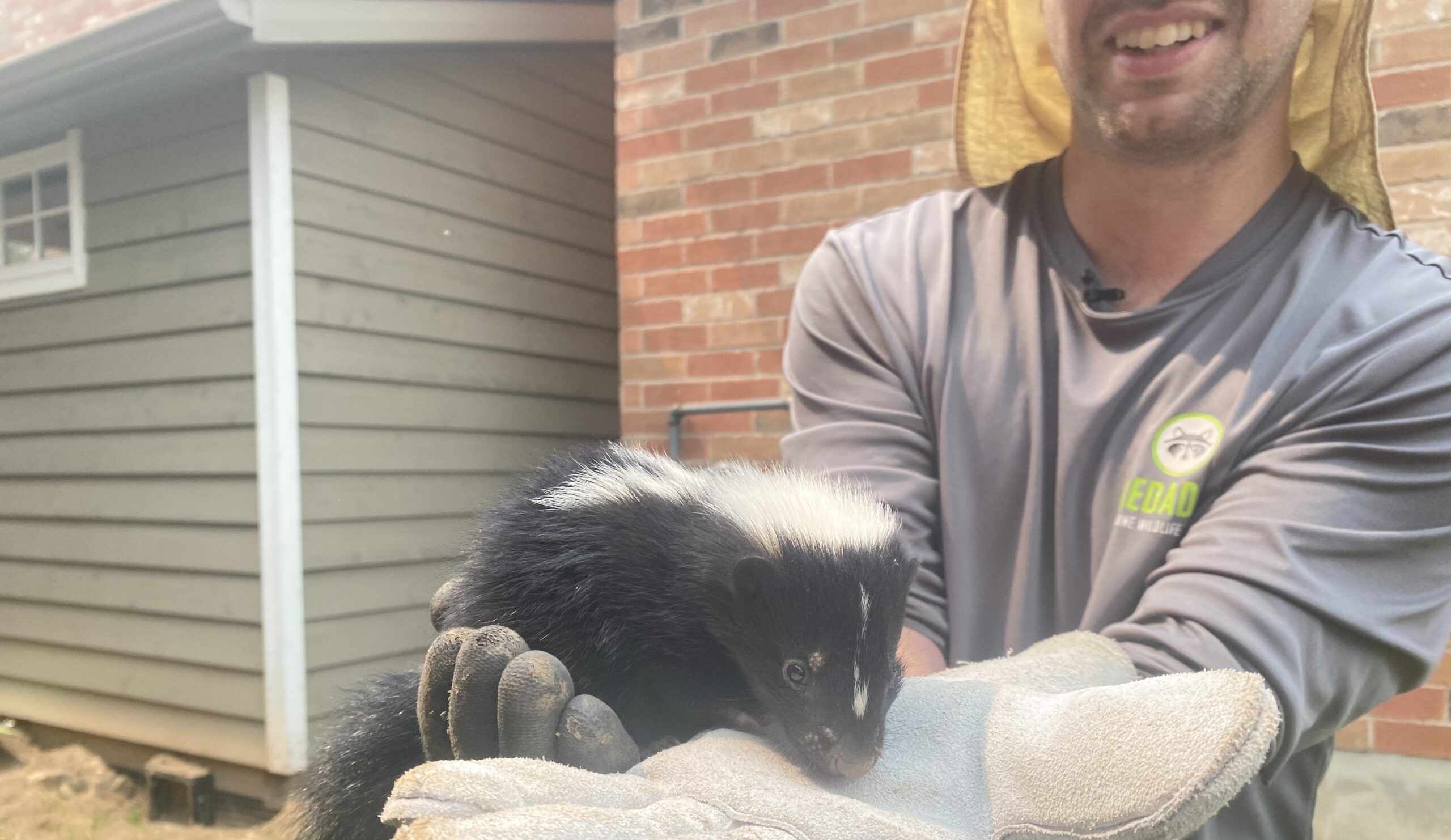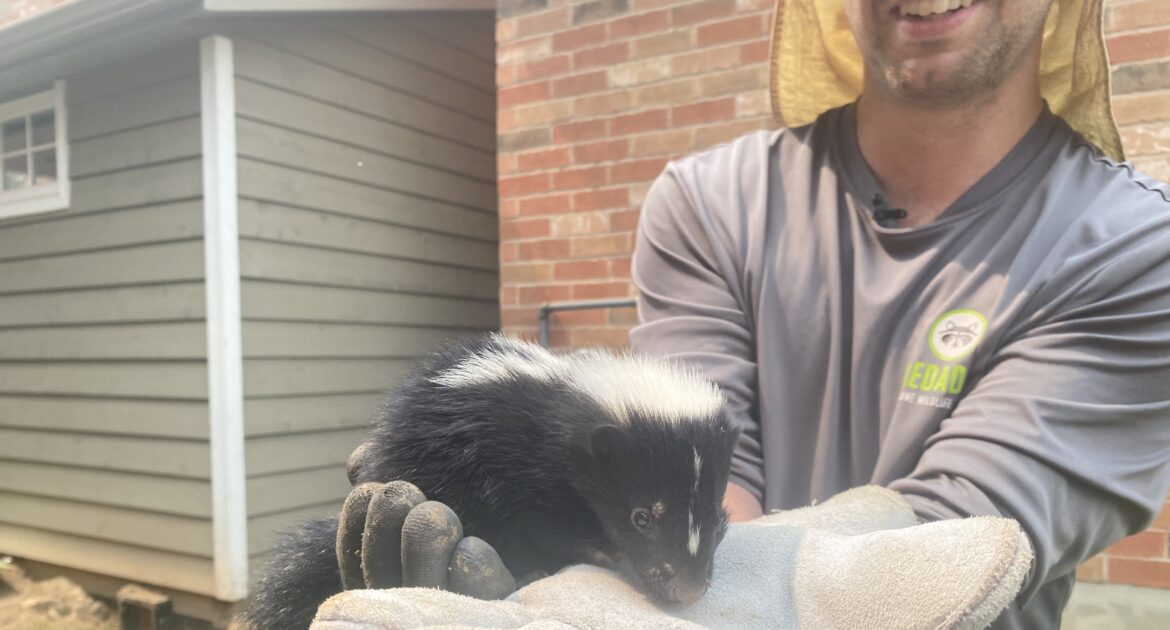When it comes to wildlife removal in Milwaukee, encountering baby skunks on your property can be a surprising and challenging situation. These small creatures may seem harmless, but they require professional attention.
Baby skunks are vulnerable and need their mother for survival. If you’re wondering how long baby skunks can live without their mother, the answer is not long—they rely on her for food and protection.
Additionally, many people are concerned about whether baby skunks can spray. The truth is, while they typically develop this ability around three weeks old, they still pose potential risks if threatened.
Ensuring the humane and safe removal of baby skunks from your property is crucial, not only for your safety and peace of mind but also for the well-being of the animals. Trust Skedaddle’s expertise to handle the situation with care and professionalism, ensuring a swift and secure solution.
Why Baby Skunks Choose Sheds
Skunks, like many wild animals, seek safe, quiet places to raise their young. Below your shed might seem like the perfect spot for a mother skunk. It’s quiet, often warm, and free from predators. Understanding why skunks choose to den under structures can help homeowners become more vigilant in preventing such occurrences.
Baby skunks are usually born in late spring or early summer. During this time, mother skunks look for a secure to give birth and nurture their young until they are old enough to fend for themselves
Potential Problems Caused by Baby Skunks
While baby skunks might seem harmless, having them on your property can lead to several issues. From health risks to structural damage, the presence of skunks in your home is something that needs immediate attention.
One of the primary concerns is the smell. Even though baby skunks might not spray as much as adults, they still have the capacity to emit that notorious skunk odor. This can permeate through your home, making it an unpleasant place to live. Additionally, the buildup of waste material and urine can further contribute to foul smells and potential health hazards.
Structural damage is another significant issue. Skunks can chew through insulation, wiring, and wooden structures. This not only weakens the integrity of your home but can also pose fire hazards due to exposed electrical wires. Repairing such damage can be costly and time-consuming.
There are also health risks to consider. Skunks can carry parasites and diseases that might be transferable to humans and pets. Handling them without proper knowledge and protection can expose you to these risks. It’s crucial to address the situation promptly and correctly to avoid these potential dangers.
How Long Can Baby Skunks Live Without Their Mother?
Understanding the needs of baby skunks is essential in handling the situation humanely. Baby skunks rely heavily on their mother for food, warmth, and protection. If the mother skunk is not present, the babies can only survive for a limited period without her care.
Typically, baby skunks are weaned from their mother at around eight weeks of age. Until then, they depend on her for nourishment. If you find baby skunks without their mother, it’s critical to act quickly. Leaving them unattended can lead to starvation and dehydration within a few days.
This reliance on the mother underscores the importance of humane removal methods. Instead of trapping or relocating the skunks, which can be harmful and ineffective, it’s better to seek professional help that ensures the safety and well-being of the animals.
Can Baby Skunks Spray?
A common concern among homeowners is whether baby skunks can spray. While baby skunks are less likely to spray compared to adults, they do possess the capability. From as young as a few weeks old, baby skunks can release a small amount of their defensive spray when they feel threatened.
The spray is a natural defense mechanism to ward off predators. It can cause intense irritation to the eyes and respiratory system, making it a significant concern if you’re considering handling the skunks yourself. The smell can also be challenging to remove from fabrics, furniture, and other surfaces.
Given the potential for spraying, it’s advisable to avoid direct contact with baby skunks. Instead, leaving the removal process to professionals who know how to handle such situations without triggering the skunks’ defense mechanisms is the safest approach.
Why Professional Help is Crucial
Dealing with baby skunks on your property is not a DIY task. The risks involved in handling wild animals, coupled with the potential for causing harm to the skunks or yourself, make professional intervention necessary.
Professionals like those at Skedaddle have the training and equipment needed to handle wildlife safely and humanely. They understand the behavior of skunks and can ensure that the removal process is carried out without causing unnecessary stress or harm to the animals.
Additionally, professionals can assess your home for entry points and provide recommendations to prevent future occurrences. This comprehensive approach not only resolves the immediate problem but also helps in safeguarding your home against wildlife invasions in the future.
Skedaddle’s Humane Approach to Wildlife Removal in Milwaukee
Skedaddle stands out as a leader in humane wildlife removal. Our approach focuses on ensuring the safety and well-being of both the animals and the homeowners. By avoiding traps and relocation, our team at Skedaddle ensures that the animals are removed in the most humane way possible.
The process starts with a thorough assessment of your home to identify entry points and nesting sites. The team then carefully removes the animals, ensuring that any young ones are reunited with their mother if possible. After the removal, we decontaminate the area to remove any waste material and potential parasites.
Finally, our trained professionals will provide recommendations and implements measures to seal entry points, preventing future wildlife invasions. This holistic approach ensures that your home remains safe and wildlife-free.
The Importance of Humane Practices
Choosing humane wildlife removal methods is not just about compliance with laws and regulations. It’s about respecting the lives of the animals and ensuring that they are treated with care and dignity.
Inhumane methods such as trapping and relocating can cause severe stress and harm to the animals. Relocated animals often struggle to find food and shelter in unfamiliar territory, leading to a high mortality rate. Humane practices, on the other hand, focus on ensuring the animals’ safety and well-being while protecting your home.
Skedaddle’s commitment to humane practices sets them apart. Their methods ensure that the animals are removed safely and that your home is protected against future invasions.
We’re Ready to Help
Discovering baby skunks on your property can be a stressful experience. However, with the right knowledge and professional help, you can handle the situation effectively and humanely. Skedaddle’s commitment to humane practices and expert service makes it the best choice for wildlife removal.
Protecting your home and ensuring the safety of the animals is crucial. By choosing Skedaddle, you are making a responsible and informed decision.
If you have discovered baby skunks on your property or need assistance with wildlife removal, don’t hesitate to reach out to Skedaddle. Our team of experts is ready to help and ensure that your home remains safe and wildlife-free. Contact Skedaddle today and experience the difference that professional and humane wildlife removal can make.




